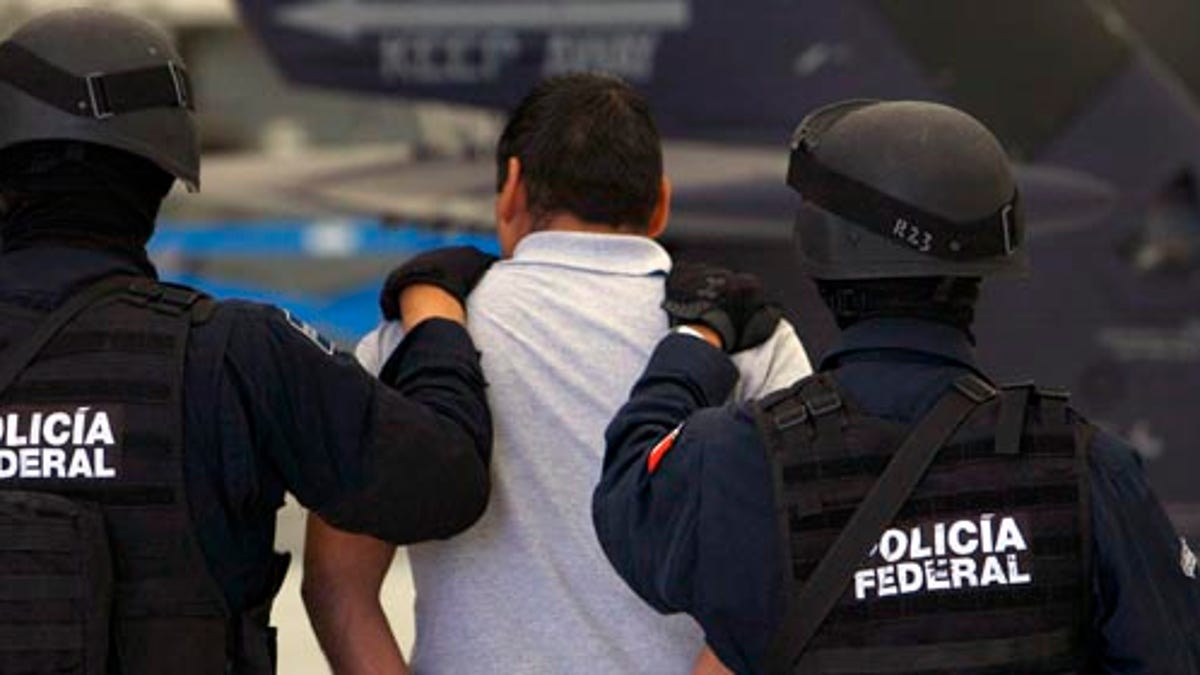
Mexican police have captured high-profile drug kingpins in recent years, but complaints of abuse and corruption from members of the force have skyrocketed. (AP2012)
Since outgoing Mexican President Felipe Calderon took office in 2006 the country's death toll as sky rocketed -- and so has the number of drug cartels operating in the country.
According to Mexican news website Sin Embargo, there are 25 drug trafficking organizations operating in the country, up from seven when Calderon assumed the presidency.
"Early in the administration of Felipe Calderon, seven criminal groups involved in drug trafficking operated in Mexico: Sinaloa, Juarez, Tijuana, Gulf, Colima, and Oaxaca Millennium, Sin Embargo reported. "Currently, the capture of some leaders, infighting and struggle for territory has created new branches that have spread throughout the country."
Despite this growth, Mexico's drug trade is still mostly controlled by two main players: Joaquin "El Chapo" Guzman's Sinaloa cartel and the ultra-violent Los Zetas.
The Zetas, originally the armed, paramilitary wing of the Gulf Cartel, broke away from their former bosses in the early 2000s and quickly rose to be arguably the second most dominant drug trafficking organization in Mexico.
If it is true, a split would likely hinder the ongoing attack on Sinaloa groups and strongholds, as Zeta groups turned on each other.
The group's violent tactics and flair for the dramatic -- bombings, beheadings, hanging bodies from overpasses -- have earned them a gruesome reputation throughout Mexico and has led the United States Drug Enforcement Administration (DEA) to describe them as perhaps "the most technologically advanced, sophisticated and violent of these paramilitary enforcement groups."
The Zetas now control much of the territory once under the rule of the Gulf Cartel. Practically all of Mexico's Gulf Coast is Zetas-controlled as are the states of Nuevo Leon, Coahuila and parts of Hidalgo, Puebla and Zacatecas.
The group also has a strong presence in Guatemala, where it was allegedly behind last year's massacre in the northern department of Peten that left 27 people dead, and there are reports of ties the Zetas and Italian organized crime groups.
There are rumors now that the Zetas have split into two rival factions that are battling for control of the central states of Zacatecas and San Luis Potosi, as well as for parts of Yucatan peninsula. While authorities have not confirmed the split, local media and some experts claim that there is enough evidence of internal strife within the Zetas.
"If it is true, a split would likely hinder the ongoing attack on Sinaloa groups and strongholds, as Zeta groups turned on each other," Shannon O'Neil, a Douglas Dillon Fellow for Latin America Studies at the Council of Foreign Relations, told Fox News Latino. "With this different dynamic it is unclear that the levels of violence would change - killings would continue, the 'teams' and actors may have shifted."
"[The split] would obviously weaken the Zetas overall, benefiting their rivals," O'Neil added.
Guzman's Sinaloa cartel -- the Zetas main rival and the country's most powerful cartel -- dominates the drug trade in its home state of the same name as well as in the states of Zacatecas, Chihuahua, Durango, Nayarit and Baja California Sur. The cartel also has influence in city's as far away as New York City, Buenos Aires and Sydney.
"Sinaloa is the heart of the drug trade, it's our Mexican Sicily," said journalist Diego Enrique Osorno, according to Sin Embargo.
The state of Sinaloa has been a hotbed of trafficking for decades, first in contraband before moving to poppy and marijuana in the 1960s and 70s.
"Nearly all of the trafficking organizations in Mexico have their origins in the region," reported Insight Crime, a Latin American news and intelligence website.
Under the command of Guzman, who escaped from a Mexican prison in 2001, the Sinaloa cartel has waged a bloody and mostly successful campaign for territory. It has also taken cues from European and Colombian organized crime groups by getting in bed with willing government officials, including allegedly members of Calderon's National Action Party (PAN).
"So strong is the perception that the PAN favors Sinaloa that Mexican justice officials issued a press release in 2010 denying it, while the Calderon government produced a video in 2011 with the same intention," Insight Crime reported. "But the perception persists."
With Calderon and the PAN relinquishing the Mexican presidency after 12 years in power, Mexicans are hoping for a change in policy toward the drug cartels as Enrique Peña Nieto and the Institutional Revolutionary Party -- a political party that has had its fair share of criticism for drug ties in the past -- take office.
For his part Peña Nieto has deflected accusations of drug ties and said that he plans to refocus the drug war's effort away from capturing high-level traffickers to reducing the number of homicides in the country. He added that he plans to expand his country's drug-war partnership with the United States, but doesn't support the presence of armed American agents in Mexico.
"Without a doubt, I am committed to having an intense, close relationship of effective collaboration measured by results," Peña Nieto told the Washington Post. "We should set measurable objectives over a determined period of time that are agreed by both governments."
